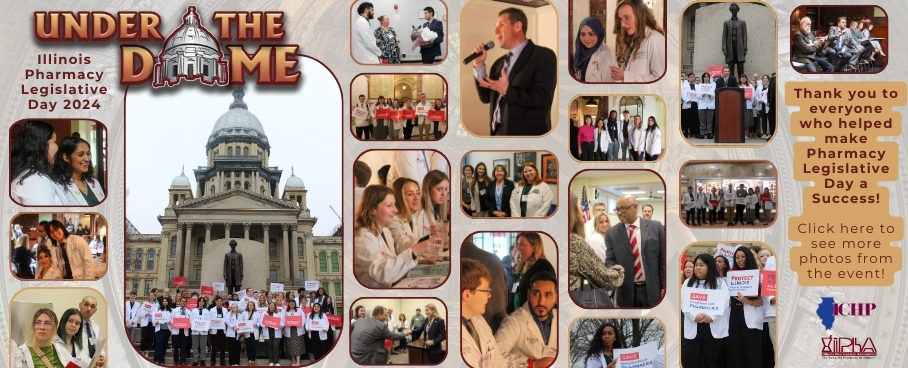
The Illinois Council of Health-System Pharmacists (ICHP) supports the recognition of pharmacists as non-physician healthcare providers under section 1861 of the Social Security Act and by health insurance providers.
Pharmacists provide patient care services in both inpatient and outpatient settings. Working with physicians, pharmacists are able to apply their medication use expertise to provide safe, accessible, high quality care that is cost effective and results in improved outcomes. To optimize therapy, pharmacists monitor the effects of patients’ medications and make recommendations and changes when appropriate. In addition, pharmacists identify and help patients overcome barriers to adherence, assist in the coordination of medical care, and ensure the continuity of patient care.
The Patient Protection and Affordable Care Act (P.I. 111-148) establishes several health care delivery models based upon an interdisciplinary, team based approach to care that draws upon the expertise of each member of the patient care team1. Licensed pharmacists are extensively trained in areas including pharmacology, medicinal chemistry, and pharmacotherapeutics. ICHP believes that the training pharmacists receive makes them a uniquely qualified member of a health care team that promotes the safe and effective use of medications.
Historically, recognition as a health care provider under the Social Security Act has been inextricably tied to direct financial compensation for services delivered. Currently, physicians and non-physicians, including, but not limited to nurse practitioners, nurse midwives, physician assistants, dietitians, and clinical social workers, are recognized as health care providers under this act. At present, pharmacists are primarily financially compensated for providing patient care services incident to physician services. This compensation is at a rate that is much lower than those same medication-related services provided by a nurse practitioner or physician assistant.
ICHP supports further implementation of third-party payment programs that include pharmacists as non-physician health care providers. Although current Medicare Part D law reimburses pharmacies for pharmacists providing some cognitive services, including medication therapy management (MTM) to a select subset of patients, the program is restrictive and encompasses only a small set of the services pharmacists are capable of providing.
ICHP supports the statement released by USPHS Pharmacist Professional Advisory Committee in their report to The Surgeon General:
“For pharmacists to continue to improve patient and health system outcomes as well as sustain various roles in the delivery of care, they must be recognized as health care providers by statute via legislation and policy, and be compensated through additional mechanisms commensurate with the level of services provided.”2 The director of the Center for Medicaid and CHIP Services issued a statement in 2017 advocating for expansion of scope of pharmacy practice: “CMCS recognizes that states continue to look for innovative tools to address pressing public health issues, such as the opioid epidemic or preventing influenza infections. State flexibilities in expanding the ability of pharmacists to prescribe, modify, or monitor drug therapy for certain medications may be effective at helping to address such issues by improving access to care. CMCS encourages states to consider using these methods to promote access particularly to those drugs that can help address priority public health issues.”3
Finally, ICHP supports legislative efforts within the Social Security Act to include pharmacists on the list of recognized healthcare providers.4
1. Patient Protection and Affordable Care Act (P.I. 111-148):
http://www.gpo.gov/fdsys/pkg/PLAW-111publ148/pdf/PLAW-111publ148.pdf. Accessed April 16, 2014.
2. USPHS Pharmacist Professional Advisory Committee. Improving Patient and Health System Outcomes through Advanced Pharmacy Practice: A Report to the U.S. Surgeon General 2011.
http://www.pharmacist.com/sites/default/files/files/USPHS_Report_USSG_1(1).pdf. Accessed April 16, 2014.
3. Centers for Medicaid & CHIP Services. State flexibility to facilitate timely access to drug therapy by expanding the scope of pharmacy practice using collaborative practice agreements, standing orders or other predetermined tools. Baltimore, MD: Centers for Medicare & Medicaid Services; 2017. Accessed July 28,2020
4. H.R. 592-11th Congress: Pharmacy and Medically Underserved Areas Enhancement Act. www.GovTrack.us. 21017. Accessed July 29, 2020
Revised 08/2020
